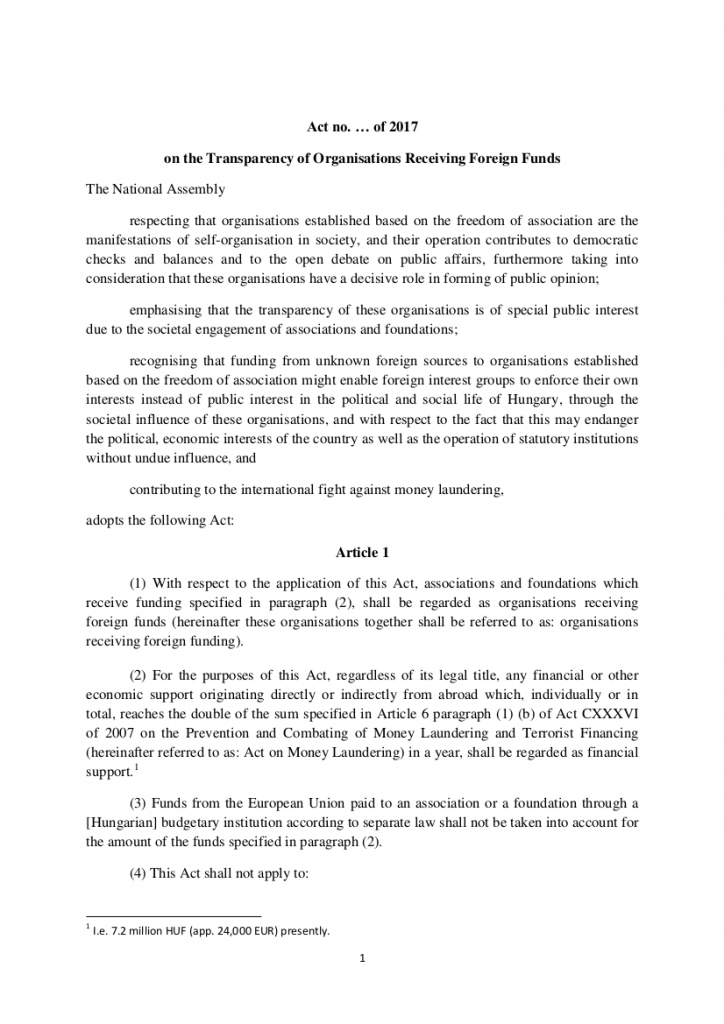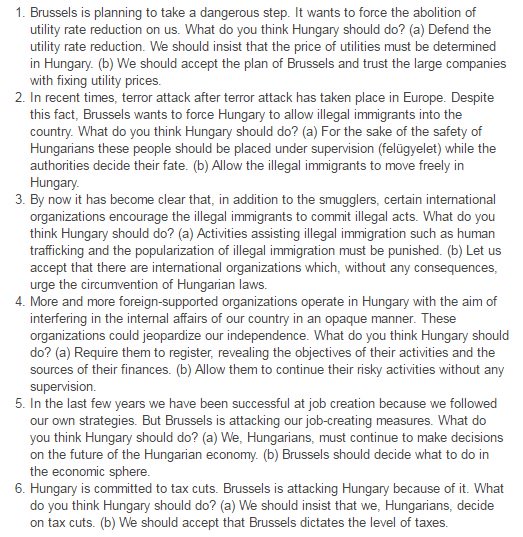




Die ungarische Regierung verschärft die Gesetze in der Flüchtlingskrise – und die Bundesregierung ist alarmiert. Können Asylsuchende noch nach Ungarn zurückgeschickt werden? Offenbar hat das Bundesinnenministerium (BMI) Zweifel, ob die ungarischen Behörden die EU-Regeln zur Unterbringung von Flüchtlingen und die EU-Standards für die Asylverfahren noch erfüllen. Laut einem Erlass des BMI vom 6. April schickt das Bundesamt für Migration und Flüchtlinge (BAMF) Schutzsuchende für ein EU-Asylverfahren nur noch in das östliche EU-Land zurück, sofern dortige Behörden dem BAMF die EU-Standards in jedem Einzelfall vorab garantieren.
UNHCR, the UN Refugee Agency, today called for a temporary suspension of all transfers of asylum-seekers to Hungary from other European States under the Dublin Regulation. The Dublin regulation is an EU instrument that determines which European State is responsible for examining an asylum seeker’s application. “The situation for asylum-seekers in Hungary, which was already of deep concern to UNHCR, has only gotten worse since the new law introducing mandatory detention for asylum-seekers came into effect,” said Filippo Grandi, United Nations High Commissioner for Refugees.
Since the elections in 2010, the current governing party has systematically undermined the rule of law inHungary,seriously disrupting the system of checks and balances. The adoption of the new constitution without the consent of the opposition and the widely criticized media regulation were followed by legislative steps weakeningindependent institutions (e.g. the Constitutional Court, the judiciary and the Ombudsman system) and violatinghuman rights (e.g. the right to fair trial) in mass numbers. These legislative steps were accompanied by the earlyremoval of leaders of independent institutions and the “court-packing” of the Constitutional Court. As shown bythe international criticism e.g. on behalf of the European Union and the Council of Europe, several rules adoptedby the governing majority were not in compliance with democratic values and international standards. The series ofgovernmental attacks against Hungarian NGOs, which organizations operate by their nature as checks and critics ofthe state power and fight for reinforcing the rule of law and ensuring the protection of human rights, is another step in the process aimed at establishing an “illiberal state”.These attacks included condemning public statements by high-ranking state officials (including the Prime Minister)alleging that some NGOs are closely linked to political parties and/or serve “foreign interests”; an illegitimate stateaudit by the Government Control Office into the use of the EEA/Norway Grants NGO Fund; criminalprocedures launched against members of the consortium of NGOs distributing the EEA/Norway Grants NGOFund; a police raid of their offices (later found unlawful by the investigationjudge); and the suspension of their taxnumbers. Even though the official proceedings launched as part of the governmental attacks against the Hungarianconsortium of NGOs distributing the EEA/Norway Grants NGO Fund and organizations supported by the NGO Fundceased or were terminated (without any criminal charges brought) by the beginning of 2016, critical and threatening statements from the government and the governing parties against human rights and watchdog NGOscontinued, primarily targeting NGOs supported by the Open Society Foundations.On 7 April 2017, a Bill on NGOs was submitted to the Parliament,prescribing, among others, organizations receiving foreign funds toregister themselves, and to label themselves as such on their website and in theirpublications.
In Ungarn findet mal wieder eine sogenannte „nationale Konsultation“ statt. Dabei handelt es sich um eine rechtlich nicht bindende Befragung der wahlberechtigten ungarischen Staatsangehörigen per Brief. Hier die – wie immer – absolut neutral formulierten Fragen und möglichen Antworten, von denen drei (2, 3, & 4) auf NGOs und Flüchtlinge abzielen:

Die systematische Misshandlung von Flüchtlingen im ungarisch-serbischen Grenzgebiet, sowohl durch amtliche „Grenzjäger“ und Polizei- sowie Militäreinheiten, aber auch durch „Freiwillige“, also rechtsextreme Schlägertrupps im Kleide von „Bürgerwehren“, ist mittlerweile nicht nur durch diverse NGO´s (AI, HRW, Ärzte ohne Grenzen) belegt, sondern auch durch eine ganze Reihe verifizierter Interviews mit Opfern durch unabhängige Journalisten, Experten des UNHCR und sogar durch ungarische Gerichtsakten.
Nicht nur die unmittelbaren Vorgesetzten der Exekutivkräfte sowie Orbáns Sicherheitsberater Bakondi leugnen die Vorfälle beharrlich und bedrohen jeden, der das Gegenteil behauptet mit Klagen, jetzt hat auch Orbán selbst in zynischen Bemerkungen, die Vorwürfe vom Tisch gewischt. Im staatlichen Rundfunk sagte er am Freitag auf die Frage, was er zu den NGO-Vorwürfen sage: „Zunächst habe ich zu sagen, dass die Situation moralisch unerträglich geworden ist. Dies sind keine zivilgesellschaftlichen Organisationen, auch wenn sie sich NGOs, also nichtregierungsnah nennen. Sie haben nichts mit den tausenden wirklichen zivilgesellschaftlichen Organisationen zu tun, die in unserem Land arbeiten. Die Tätgikeit dieser internationalen Netzwerke, das muss ich wirklich sagen, besorgt mich wirklich tief.“ (…) „Junge ungarische Polizisten und Soldaten leisten da unten an der Grenze eine harte Arbeit, aber diese Organisationen beschuldigen unsere Grenzschützer, ihre Arbeit nicht richtig zu machen, dass sie Wölfe in menschlicher Haut seien, … die Freude daran hätten Menschen zu misshandeln.“ Das Gegenteil sei der Fall. „Sie sorgen permanent für die Sicherheit der ungarischen Menschen, in einer sehr komplexen Situation. Diese Leute verdienen Anerkennung… Und dann kommen da irgendwelche Organisationen daher, die die Situation in einer Art behandeln, die völlig entfernt von ungarischen Interessen ist und greifen diese Menschen an.“ Die NGOs nutzten „jede Art von rechtlichen Schlupflöchern“, um Ungarn „vor internationalen Gerichten anzuschwärzen“, dabei würden sie „erfolgreich Asylsuchende vorführen“, um „gegen Ungarn vorzugehen“. Warum sollten „unsere jungen Menschen das Risiko auf sich nehmen, unsere Gernzen zu schützen, ihr eigenes Leben für die Sicherheit des Landes auf sich nehmen, wenn ihnen hier in Budapest und in Brüssel in den Rückgen gefallen wird?“
The bill would require Hungarian NGOs that receive more than HUF 7.2 million (USD 25,000) from foreign sources to register with authorities and represent themselves to the public as foreign-funded organizations. The bill’s authors decided, however, that the transfer of European Union funds into Hungary is not applicable under this rule.
- civil organizations and foundations must register with authorities within 15 days of meeting the annual threshold. The organizations must itemize each such transaction for the authorities.
- this information would be made public on the government-operated Civil Information Portal.
- the organizations must immediately report on their website (or anything they publish) that according to Hungarian law, they are recognized as a foreign-funded organization.
- applicable organizations that do not identify themselves as foreign-funded will be fined. If they refuse to abide by the law, prosecutors can remove the organization from Hungary’s corporate registry.
- organizations can only be de-listed as foreign-funded organizations after five consecutive years of receiving less than the annual HUF 7.2 million threshold;
- churches and religious organizations are exempt from having to register as foreign-funded organizations.
The European Court of Human Rights has banned Hungarian authorities from transferring eight teenagers and a pregnant woman from a refugee asylum near Budapest to the transit zone along the Hungary-Serbia border to be detained, the Hungarian Helsinki Committee reported on Tuesday. The procedure was initiated by the committee last Friday, with regard to Hungary’s new border regulations taking effect, under which “obviously vulnerable clients in need of special treatment” could have been transferred from open camps to closed facilities in the transit zone.